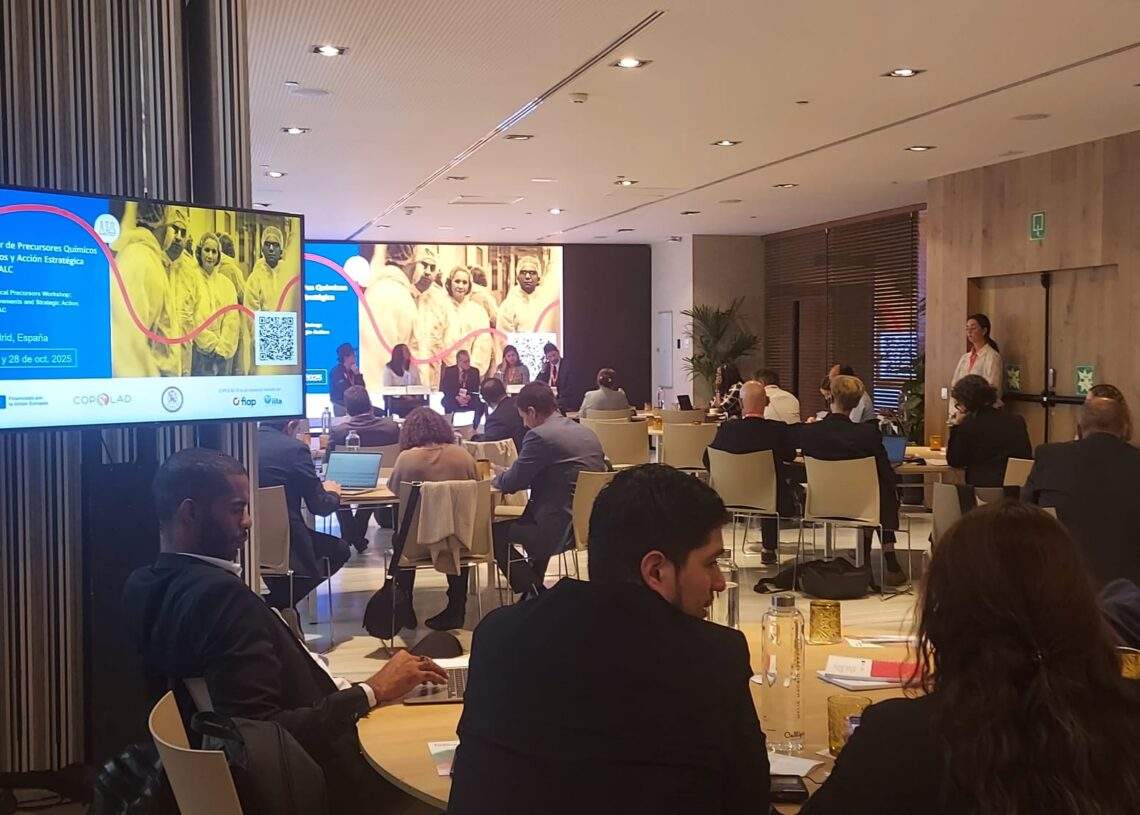The Cooperation Program on Drugs between the EU and Latin America and the Caribbean (COPOLAD III) held on October 27 and 28 in Madrid the Chemical Precursors Workshop: Achievements and Strategic Action EU–LAC, a meeting that brought together government representatives, international organizations, and technical experts to consolidate experiences, promote best practices, and define the next steps in bi-regional cooperation on the control and sustainable management of chemical precursors.
Over the two days of work, participants reviewed progress in the COPOLAD III line of action dedicated to controlling precursors for illicit drug manufacture, identifying common challenges and joint strategies to strengthen regulatory frameworks, institutional coordination, and cross-border cooperation.
COPOLAD III, funded by the EU, works with Latin American and Caribbean countries, under the technical leadership of the Intelligence Center against Terrorism and Organized Crime of Spain (CITCO), to reinforce precursor control systems, improve normative frameworks, and promote regional cooperation.
In the area of precursor management and final disposal, reference manuals were developed and officially approved in seven countries — Bolivia, Colombia, Ecuador, El Salvador, Honduras, Paraguay, and the Dominican Republic — establishing guidelines for handling, transporting, and disposing of these substances. Furthermore, 668 public officials received specialized training in applying these manuals.
As a complementary measure, over 100 officials from Latin America and the Caribbean participated in the two editions of the Advanced Specialization Course in the Control and Investigation of Drug Precursors, a 500-hour program developed in collaboration with the UNED Foundation in Spain.
Regulations
On the regulatory front, COPOLAD III supported Colombia, El Salvador, Honduras, the Dominican Republic, Antigua and Barbuda, and Saint Lucia in updating or creating legal frameworks aimed at harmonizing national regulations, improving interagency coordination, and promoting an integrated vision of precursor chemical control and management. In Ecuador, the program also contributed to the development of a technological tool to strengthen analysis, monitoring, and control of transactions involving regulated substances, aligned with the guidelines of the reference manuals.
The workshop was inaugurated by Francisco Tierraseca, director of the Foundation for the Internationalization of Public Administrations (FIAP), and Francisco Javier Marín Lizarraga, director of CITCO. During the opening session, Borja Díaz Rivillas, director of COPOLAD III, and Milagros Diego Risco, head of the precursor Task Force, presented a review of actions and achieved results in this line of work.
Throughout the meeting, key topics were addressed such as current difficulties in precursor control, new trends and designer precursors, regulatory harmonization in the Latin American and Caribbean region, and cooperation with the private sector. In addition, the Treatment Manuals for the Management and Final Disposal of Precursors and Chemical Substances, designed as support tools for countries in the region, were presented.
The closing was led by Milagros Diego Risco and Trotsky Gustavo Santamaría, who emphasized the commitment of participating countries and the importance of continuing to promote an integrated approach linking public health, environmental protection, and international cooperation.






